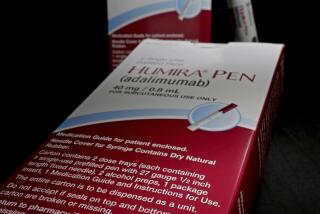Generic-Drug Makers’ Share Prices Vastly Overvalued, Analysts Say
- Share via
Generic-drug makers’ shares, among the best-performing stocks in the U.S. last year, are overvalued now, given the prospect that prices may decline for the medicines, analysts say.
Share prices of Barr Laboratories Inc., Ivax Corp. and Andrx Group more than doubled in 2000, when investors bet generic-pharmaceutical companies would benefit as a raft of brand-name drugs lose patent protection over the next five years. Some of those stocks are trading at 45 to 50 times expected earnings, nearly twice the levels of many major brand-name drug makers.
The Food and Drug Administration gives the first approved generic version of a drug a six-month head start in the market. After that, competition from generic rivals can drive prices down more than 50%, making it difficult to sell enough drugs to make up for the decline, said Megan Murphy and Richard Stover, analysts at Arnhold & S. Bleichroeder Inc.
“These are commodity products after that, and the 180-day exclusivity is really just a one-time, nonrecurring gain,” Murphy said. “It’s a house of cards.”
Large brand-name drug makers generally trade at 27 to 30 times expected earnings, Murphy said.
Generic-drug companies make medicines that are chemically identical to brand-name drugs. If approved, they can be introduced after patent protection for the brands expires.
Murphy and Stover initiated coverage of Barr Labs, whose shares more than tripled last year, with a “sell” rating in a report they issued last week. The stock’s rise made it one of the best-performing generic-drug makers. The ratio of its price to the company’s expected fiscal 2001 earnings is 43.
Barr Labs disagreed with several of the report’s assumptions and noted that there are at least seven other analysts with “buy” or “strong buy” recommendations on the company’s stock, said Carol Cox, a Barr spokeswoman.
“Obviously the majority disagrees,” Cox said.
Murphy attributed the run-up in shares of generic-drug makers to investors who don’t understand the industry.
“Generic manufacturers appear to be grossly overvalued as a group,” the report said. “Even though the group has backed off, we believe the stocks are still overvalued.”
Barr sells AstraZeneca’s cancer drug tamoxifen in the U.S. The arrangement generates more than $300 million annually.
Tamoxifen will face increased competition after its patent expires in August 2002. The report said Barr may have misled investors by saying profit margins on tamoxifen will rise after the patent expires. At that time, Barr plans to make the drug itself.
Bruce Downey, Barr’s chief executive, said in a conference call with investors last week that the company never misled investors and that it has publicly stated the risks when the tamoxifen patent expires. Downey said he expects margins to rise on the product faster than any decline in revenue because Barr will then be manufacturing as well as distributing the drug.
Barr’s Cox said that based on the recent history of other drugs after patent expiration, the analysts were assuming an unrealistically high level of competition for tamoxifen after it loses protection.
Many generic-drug makers, including Barr, Ivax and Mylan Laboratories Inc., have been trying to build up their brand-name drug businesses to help fuel earnings growth and make revenue less volatile.
Still, the shares of these companies also have been driven up by the prospect of increased demand for less expensive drugs as health-care costs rise. That may have made some of these stocks too expensive, said David Katz, chief investment officer of Matrix Asset Advisors.
“In aggregate, we’d agree that the valuations on this group are pretty rich right now,” Katz said. “This is a very good long-term growth area, but unlike big [drug makers], earnings tend to be erratic.”
Katz said he has been buying Mylan Labs shares, which have fallen 11% this year after finishing unchanged in 2000. Mylan’s stock trades at about 22 times expected fiscal 2001 earnings.
Katz said he expects the price-to-earnings ratios of most generic-drug company stocks to converge at about 30.
More to Read
Inside the business of entertainment
The Wide Shot brings you news, analysis and insights on everything from streaming wars to production — and what it all means for the future.
You may occasionally receive promotional content from the Los Angeles Times.










